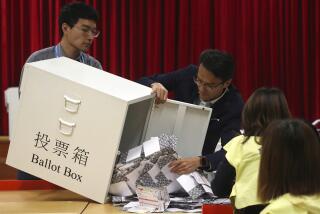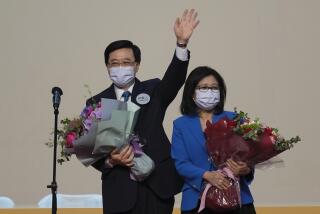Hong Kong Leader Pressed to Explain Electoral Changes
- Share via
WASHINGTON — President Clinton “expressed his disappointment” Friday to Hong Kong’s new chief executive, Tung Chee-hwa, over the recent decision to roll back the democratic reforms of the last years of British rule, according to White House Press Secretary Mike McCurry.
Tung was selected with China’s strong backing as the first chief executive to run Hong Kong after it returned to Chinese sovereignty July 1. He has spent the last few days in Washington attempting to line up support for his new government and ease fears that it may drastically curb civil liberties in Hong Kong.
However, in meetings with Clinton administration officials and on Capitol Hill, he encountered considerable skepticism and criticism. In particular, Tung was pressed repeatedly to explain why Hong Kong is changing its electoral system in such a way that the number of legislators who are popularly elected will be reduced.
During a half-hour session at the White House on Friday, Clinton told Tung that the United States “will be watching events when it comes to the political status of institutions in Hong Kong very closely,” McCurry said.
But the president did not specify any particular action that the United States might take concerning Hong Kong.
In contrast, on Capitol Hill this week, several senators--including Foreign Relations Committee Chairman Jesse Helms (R-N.C.)--introduced a resolution calling for the changes in Hong Kong’s election laws to be submitted to a referendum.
“If the United States is to have a relationship with an autonomous Hong Kong, Hong Kong must have the democratically elected legislature it was promised,” Helms said in the Senate earlier this week.
Chris Patten, Hong Kong’s last British governor, changed the rules for electing Hong Kong’s Legislative Council by broadening the number of people who could vote directly for their representatives. These changes were bitterly contested by China and were the main source of Beijing’s intense animosity toward Patten and the departing British government.
In the 1995 elections, the party led by Martin Lee, Hong Kong’s leading pro-democracy activist, won the largest number of legislative seats. Clinton met with Lee when he visited Washington last spring.
The current controversy is over the rules for Hong Kong’s first election under Chinese sovereignty next year. In July, a week after Tung was sworn in, his new government announced that the 1998 elections will take place under rules that dismantle many of Patten’s changes.
For example, some of Hong Kong’s legislative seats will be chosen by companies, banks and professional associations. Moreover, popularly elected seats will be subjected to a new, European-style “proportional representation” system rather than the “winner-takes-all” approach used in the 1995 elections.
The effect could be to reduce the strength of the pro-democracy leaders and political parties that won broad popular support in the last election. Lee, in a signed article in Friday’s Washington Post, termed these new election rules “a great leap backward for democracy in Hong Kong.”
In his session with Clinton, Tung did not dispute the need for democracy in Hong Kong but rather pleaded for more time, according to a senior administration official.
‘He did not make an Asian-values argument” against democracy, the official said. “He said it’s just a matter of time, of how fast we do them.”
However, another U.S. official said that Tung’s plea to move slowly toward democracy in Hong Kong had not been persuasive.
“Hong Kong’s electoral system is going backward,” the official said. “It’s hard to argue for gradualism in Hong Kong when you’ve got an educated, urbanized population that has already been participating in elections.”
More to Read
Sign up for Essential California
The most important California stories and recommendations in your inbox every morning.
You may occasionally receive promotional content from the Los Angeles Times.













